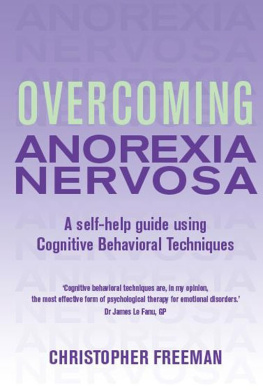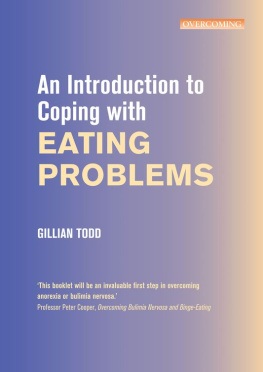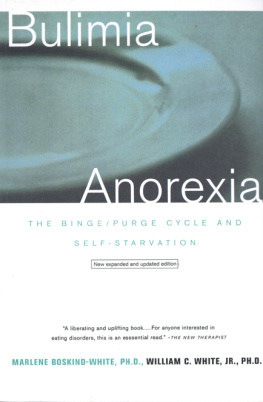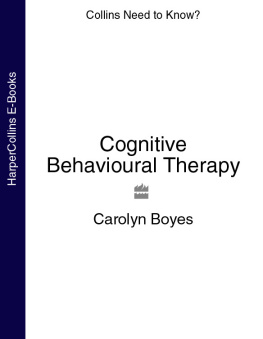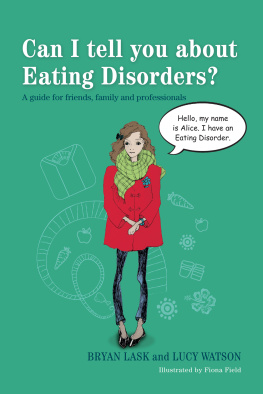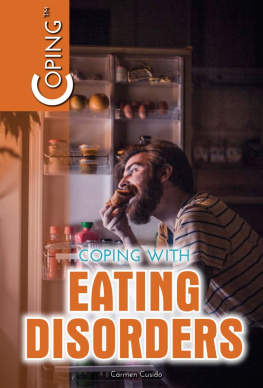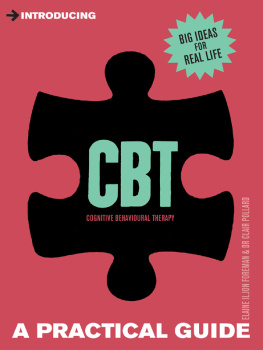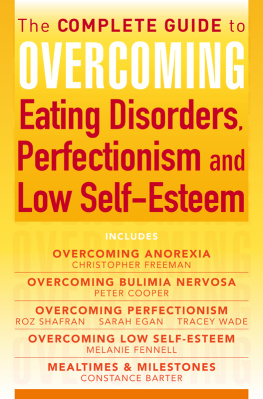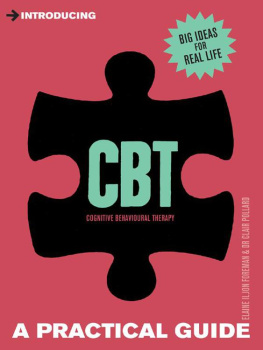Dr Chris Freeman is one of the UKs leading authorities on Anorexia Nervosa. He is based at his Eating Disorders Clinic at the Cullen Centre, The Royal Edinburgh Hospital in Scotland.
The aim of the Overcoming series is to enable people with a range of common problems and disorders to take control of their own recovery program. Each title, with its specially tailored program, is devised by a practising clinician using the latest techniques of cognitive behavioral therapy techniques which have been shown to be highly effective in changing the way patients think about themselves and their problems. The series was initiated in 1993 by Peter Cooper, Professor of Psychology at Reading University in the UK whose book on overcoming bulimia nervosa and binge-eating continues to help many people in the UK, the USA, Australasia and Europe. Many books in the Overcoming series are recommended by the UK Department of Health under the Books on Prescription scheme.
Titles in the series include:
OVERCOMING ANGER AND IRRITABILITY
OVERCOMING ANOREXIA NERVOSA
OVERCOMING ANXIETY
OVERCOMING BODY IMAGE PROBLEMS
OVERCOMING BULIMIA NERVOSA AND BINGE-EATING
OVERCOMING CHILDHOOD TRAUMA
OVERCOMING CHRONIC FATIGUE
OVERCOMING CHRONIC PAIN
OVERCOMING COMPULSIVE GAMBLING
OVERCOMING DEPERSONALIZATION AND FEELINGS OF UNREALITY
OVERCOMING DEPRESSION
OVERCOMING GRIEF
OVERCOMING HEALTH ANXIETY
OVERCOMING INSOMNIA AND SLEEP PROBLEMS
OVERCOMING LOW SELF-ESTEEM
OVERCOMING MOOD SWINGS
OVERCOMING OBSESSIVE COMPULSIVE DISORDER
OVERCOMING PANIC
OVERCOMING PARANOID AND SUSPICIOUS THOUGHTS
OVERCOMING RELATIONSHIP PROBLEMS
OVERCOMING SEXUAL PROBLEMS
OVERCOMING SOCIAL ANXIETY AND SHYNESS
OVERCOMING STRESS
OVERCOMING TRAUMATIC STRESS
OVERCOMING WEIGHT PROBLEMS
OVERCOMING WORRY
OVERCOMING YOUR CHILDS FEARS AND WORRIES
OVERCOMING YOUR CHILDS SHYNESS AND SOCIAL ANXIETY
OVERCOMING YOUR SMOKING HABIT
All titles in the series are available by mail order.
Please see the order form at the back of this book.
www.overcoming.co.uk
OVERCOMING
ANOREXIA NERVOSA
A self-help guide using
Cognitive Behavioral Techniques
CHRIS FREEMAN
ROBINSON
London
Constable & Robinson Ltd
5556 Russell Square
London WC1B 4HP
www.constablerobinson.com
First published in the UK by Robinson,
an imprint of Constable & Robinson Ltd, 2002
This edition published in 2009
Copyright Chris Freeman 2002, 2009
The right of Chris Freeman to be identified as author of this work has been asserted by him in accordance with the Copyright, Designs and Patents Act, 1988.
All rights reserved. No part of this publication may be reproduced in any form or by any means without the prior written permission of the publisher.
A copy of the British Library Cataloguing in Publication Data for this title is available from the British Library.
Important Note
This book is not intended to be a substitute for medical advice or treatment. Any person with a condition requiring medical attention should consult a qualified medical practitioner or suitable therapist.
ISBN 978-1-84901-130-3
eISBN 978-1-47210-569-1
Printed and bound in the EU
1 3 5 7 9 10 8 6 4 2
To Aleck, my father,
the wisest man I have known
Table of contents
Acknowledgments
To all current and past staff at the Cullen Centre for Eating Disorders, Edinburgh, who are, and have been, a great clinical team to work with, and who have discussed and practised many of the ideas in this book. Particular thanks to Charlotte Nevison and Patricia Graham, who as psychology trainees did much of the spade work.
Foreword
Why cognitive behavior therapy?
Over the past two or three decades, there has been something of a revolution in the field of psychological treatment. Freud and his followers had a major impact on the way in which psychological therapy was conceptualized, and psychoanalysis and psychodynamic psychotherapy dominated the field for the first half of this century. So, long-term treatments were offered which were designed to uncover the childhood roots of personal problems offered, that is, to those who could afford it. There was some attempt by a few health service practitioners with a public conscience to modify this form of treatment (by, for example, offering short-term treatment or group therapy) but the demand for help was so great that it had little impact. Also, whilst numerous case histories can be found of people who are convinced that psychotherapy did help them, practitioners of this form of therapy showed remarkably little interest in demonstrating that what they were offering their patients was, in fact, helpful.
As a reaction to the exclusivity of the psychodynamic therapies and the slender evidence of their usefulness, in the 1950s and 1960s a set of therapeutic techniques was developed, collectively termed behavior therapy. These techniques shared two basic features. First, they aimed to remove symptoms (such as anxiety) by dealing with those symptoms themselves, rather than their deep-seated underlying historical causes (traditionally the focus of psychoanalysis, the approach developed by Sigmund Freud and his associates). Second, they were scientifically based, in the sense that they used techniques derived from what laboratory psychologists were finding out about the mechanisms of learning, and they put these techniques to scientific test. The area where behavior therapy initially proved to be of most value was in the treatment of anxiety disorders, especially specific phobias (such as extreme fear of animals or heights) and agoraphobia, both notoriously difficult to treat using conventional psychotherapies.
After an initial flush of enthusiasm, discontent with behavior therapy grew. There were a number of reasons for this, an important one of which was the fact that behavior therapy did not deal with the internal thoughts which were so obviously central to the distress that many patients were experiencing. In particular, behavior therapy proved inadequate when it came to the treatment of depression. In the late 1960s and early 1970s a treatment for depression was developed called cognitive therapy. The pioneer in this enterprise was an American psychiatrist, Professor Aaron T. Beck. He developed a theory of depression which emphasized the importance of peoples depressed styles of thinking, and, on the basis of this theory, he specified a new form of therapy. It would not be an exaggeration to say that Becks work has changed the nature of psychotherapy, not just for depression but for a range of psychological problems.
In recent years the techniques introduced by Beck have been merged with the techniques developed earlier by the behavior therapists to produce a therapeutic approach which has come to be known as cognitive behavioral therapy (or CBT). There are two reasons why this form of treatment has come to be so important within the field of psychotherapy. First, cognitive therapy, as originally described by Beck and developed by his successors, has been subjected to the strictest scientific testing; and it has been found to be a highly successful treatment for a significant proportion of cases of depression. Not only has it proved to be as effective as the best alternative treatments (except in the most severe cases, where medication is required), but some studies suggest that people treated successfully with cognitive behavior therapy are less likely to experience a later recurrence of their depression than people treated successfully with other forms of therapy (such as anti-depressant medication). Second, it has become clear that specific patterns of thinking are associated with a range of psychological problems and that treatments which deal with these styles of thinking are highly effective. So, specific cognitive behavioral treatments have been developed for a range of anxiety disorders, such as panic disorder, generalized anxiety disorder, specific phobias, social phobia, obsessive compulsive disorders, and health anxiety, as well as for other conditions such as drug addictions, and eating disorders like anorexia nervosa and bulimia nervosa. Indeed, cognitive behavioral techniques have been found to have an application beyond the narrow categories of psychological disorders. They have been applied effectively, for example, to helping people with weight problems, couples with marital difficulties, as well as those who wish to give up smoking or deal with drinking problems. They have also been effectively applied to dealing with low self-esteem.
Next page
